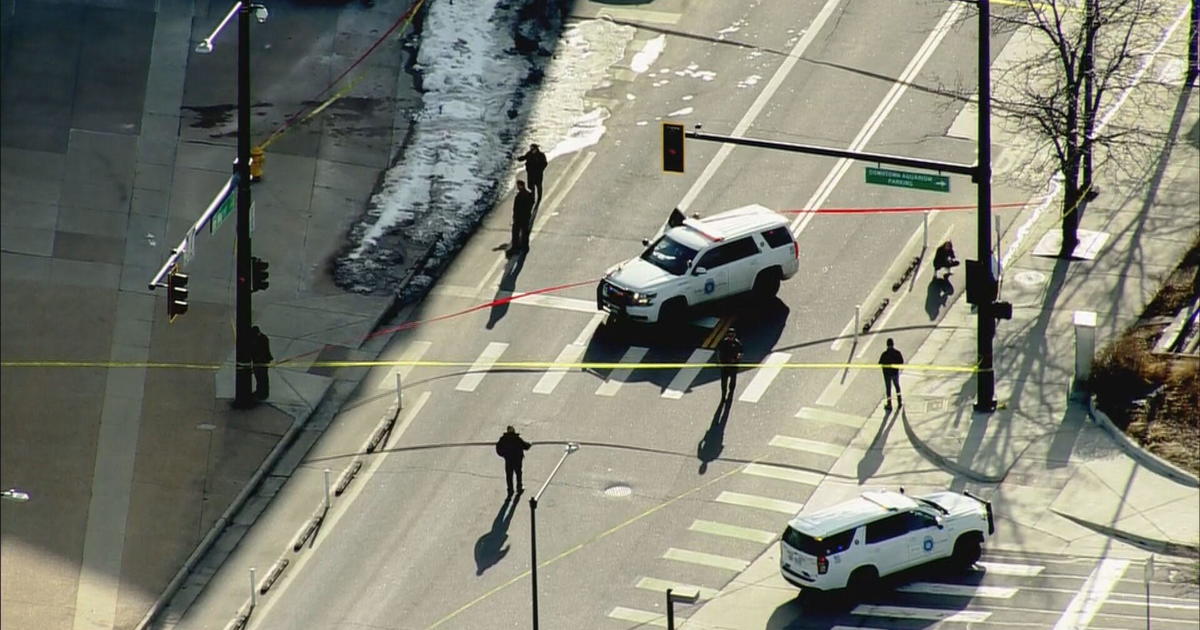Death Penalty Choice Looms In Aurora Shooting Case
CENTENNIAL, Colo. (AP) - Over the past several weeks, prosecutors in the Aurora movie theater shooting case have been speaking to the 70 people injured in the rampage and survivors of the 12 killed to ask whether they want suspect James Holmes to be executed if convicted.
Prosecutors should announce by April 1 whether they will seek the death penalty, the next significant step in the slow-moving legal case. They will make their decision as Colorado's legislature considers repealing the death penalty in a state that has had an uneasy relationship with capital punishment.
Colorado has executed only one person since the U.S. Supreme Court reinstated the death penalty in 1976. Just three people are currently on death row. One of them is due to be executed soon for killing four people in 1993 at a Chuck E. Cheese restaurant.
Only one district attorney has pursued the death penalty in recent years. That was Carol Chambers, who filed the initial charges against Holmes but was term-limited and left office in January. A spokeswoman for Chambers' elected replacement, George Brauchler, said she could not comment, citing a gag order in the Holmes case.
Colorado's lower house voted to repeal the death penalty in 1999, but the effort stalled in the Senate. Critics of the penalty believe they have enough votes to pass a ban in the Democrat-controlled legislature this year.
"This all has to weigh on the mind of George Brauchler," said Dan Recht, a Denver criminal defense attorney who said he expects prosecutors to seek Holmes' execution. "The death penalty may very well be eliminated in Colorado."
The July 20 attack on a midnight showing of "The Dark Knight Rises" inspired legislation to ban the sort of high-capacity ammunition magazines Holmes allegedly used. The legislation passed on Wednesday, and Gov. John Hickenlooper, a Democrat, has said he'd sign it.
State Rep. Claire Levy was working on her proposal to end capital punishment long before the theater shooting. She plans to introduce the legislation on Friday and said it would not apply to Holmes — only to crimes committed after the bill is signed into law. Hickenlooper has not said whether he supports it.
Levy said she expects Aurora to come up during the debate. "It's not a question of comparing one depravity against another," she said. "I do not think it's an appropriate penalty in any case."
Dave Young, district attorney for suburban Adams County and a death penalty supporter, said the Aurora shootings illustrate why Colorado should keep capital punishment. "When you have a mass killing, when you have someone who kills for fun, they should be treated differently," Young said.
Young added that the penalty is useful in giving some murder defendants reason to plea bargain rather than go to trial.
"In Colorado, the death penalty is used appropriately," he said. "It is not used on cases where ID is an issue."
Recht said a decision to seek the death penalty could ultimately lead to a plea deal like the one for Jared Loughner in the 2011 Tucson, Ariz., mass shootings. After more than a year of medical treatment, Loughner was ruled competent to stand trial and pleaded guilty in exchange for life in prison.
"All plea bargain options are still on the table," Recht said.
Michael Radelet, a sociology professor at the University of Colorado, Boulder who has long studied the death penalty and opposes it, said Colorado has always been cautious with capital punishment.
In 1897, the state abolished the death penalty, only to restore it in 1901 after an outbreak of lynchings embarrassed it. "Colorado has always had a sizeable libertarian component of distrust for government and an active religious community," Radelet said.
The 18th Judicial District, where two of the three people on death row committed their crimes and where Holmes is being tried, is the state's busiest, prosecutors say — one reason it has been the only one to pursue capital cases in the past five years.
On Tuesday, a judge entered a not guilty plea on Holmes' behalf after his attorneys said they weren't ready. They have argued that, for complex legal reasons, they cannot enter what they have indicated is a likely plea of not guilty by reason of insanity until prosecutors announce their death penalty decision. An insanity plea, if upheld by a jury, would spare Holmes execution.
Karen Steinhauser, a former Denver prosecutor who teaches at the University of Denver's Law School, said prosecutors can always withdraw the death penalty should independent psychiatrists find that Holmes is mentally ill. Still, given the number of victims they must consult, that will not be an easy decision.
"That in and of itself is difficult," she said.
Radelet estimated that it could cost $25 million or more to try to execute Holmes in a process likely to spawn decades of legal challenges.
That weighs on the minds of victims who have waited nearly eight months for Holmes' initial plea.
Marcus Weaver was wounded in the shooting. His friend, Rebecca Wingo, an Air Force veteran, was killed. Weaver said the district attorney's office has asked victims like him to tell them whether they want prosecutors to pursue execution.
Weaver told reporters Tuesday that, based on his conversations with other victims, "the death penalty does seem to be what everybody feels like." But the former death penalty opponent said he'd only favor capital punishment if Holmes' attorneys drag the case out. He said he'd be comfortable with life in prison if the suspect pleaded guilty.
Jessica Watts, whose cousin, Jonathan Blunk, a Navy veteran, was killed, said it's a difficult decision.
"It's a really hard thing to think about, putting someone to death unnaturally," she said.
By NICHOLAS RICCARDI, Associated Press
(© Copyright 2013 The Associated Press. All Rights Reserved. This material may not be published, broadcast, rewritten or redistributed.)



